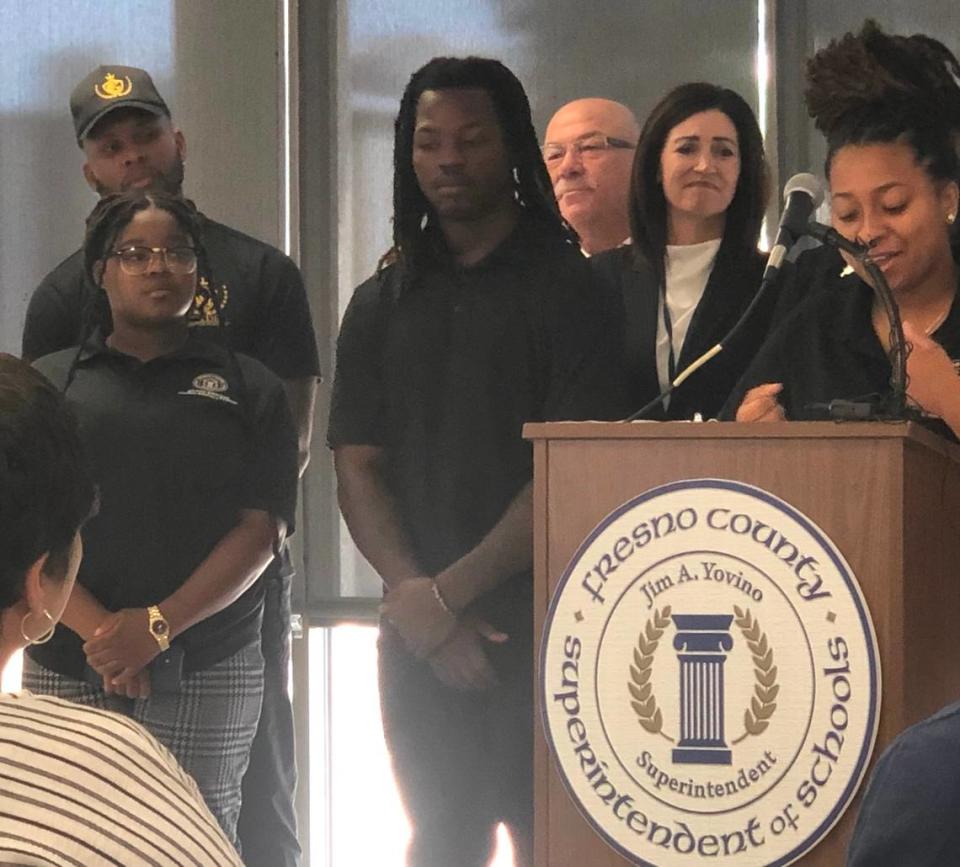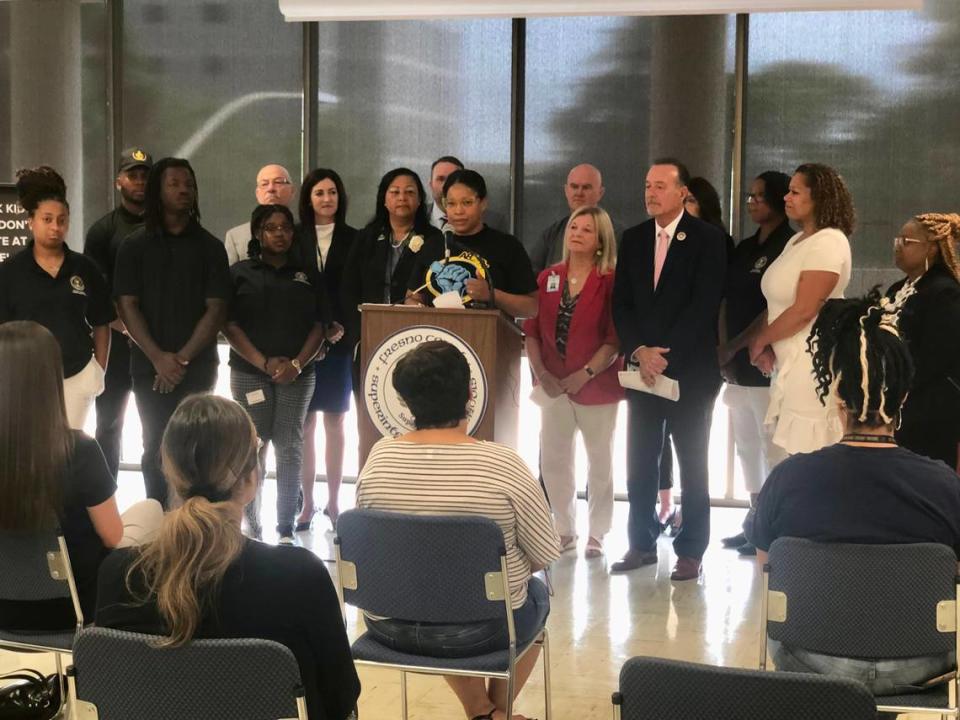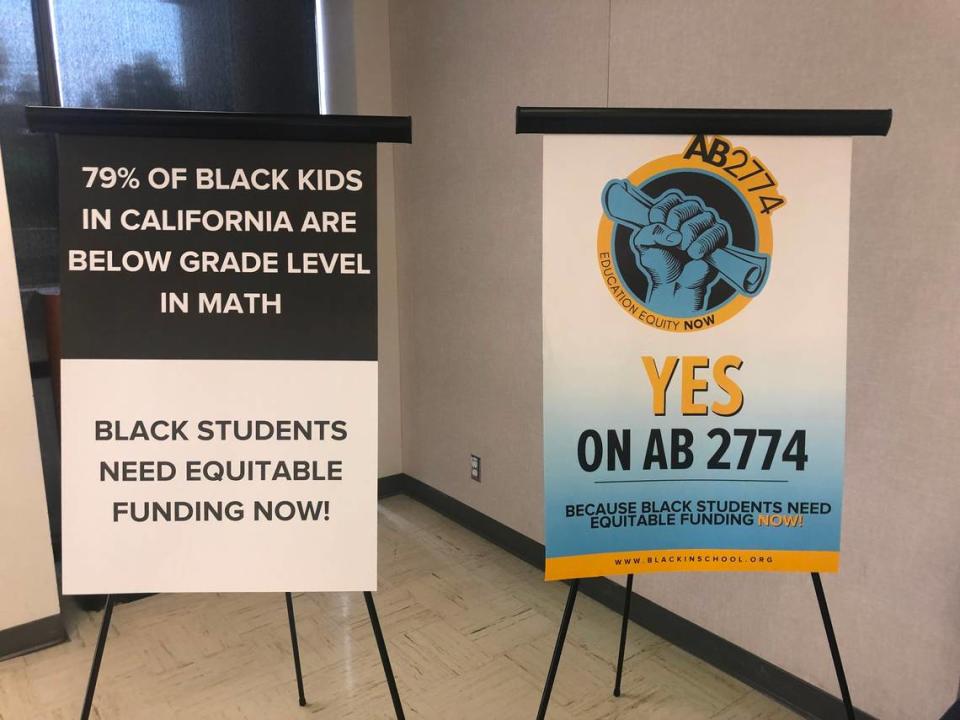California has ‘failed’ Black students for years. Fresno schools say Newsom could change that
Students, superintendents and school board members from across Fresno called out California’s failure to fund the state’s lowest performing students during a news conference this week at the Fresno County Office of the Superintendent.
The state, since 2013, has invested millions of dollars in its high-need students, who include English learners, low-income students and foster or homeless youth.
“Those students are showing results,” said Margaret Fortune, president of Fortune School of Education. “African American students need to stand right beside those groups, not because they’re Black but because of their performance.”
Assembly Bill 2774 can make that happen, supporters say. If passed, the legislation would make available $400 million annually for the group of students with the lowest scores on state tests.
Based on the last available data from 2019 — and data dating back for decades — Black students would be first in line in most of California.
“For more than two decades, California has failed to name the problems Black students face,” Fortune said about California not discussing Black students’ academic needs. “Because of that, our Black students have become invisible. Now we’re showing up in the data in ways that are alarming.”
In California, 67% of Black kids don’t read or write at grade level, 79% are below grade level in math, and over 85% are not proficient in science, Fortune noted from the California Department of Education’s accountability report.
“It’s because of those statistics that the state should be targeting them for academic improvement,” she said.
About 2,967 Black students in Fresno County and around 80,000 statewide would potentially benefit from the proposed change to the state’s funding formula.
’Give our students the opportunity to perform’

During Thursday’s news conference, Golden Charter School founder Robert Golden boomed on the microphone that “life is not based on potential; it’s based on performance.”
“Our students have a lot of potential to be great, but we’re not performing at that level,” he said. “If this bill is passed, it’s going to give our students the opportunity to perform.”
Students on the African American Student Advisory Cabinet, established in 2016 by Fresno County Superintendent Jim Yovino, were described by Yovino as examples of the excellence thousands of Black students possess when supported.
Yovino pointed to Zurrie Addo Boateng, a 2022 graduate of Design Science Middle College High School who will start at Fresno State as a junior after excelling in dual enrollment courses.
She said she often wondered why other Black kids didn’t have the same opportunities as she did; she was one of four Black students in her graduating class of fewer than 70. Because the design science school is based on lottery enrollment, she said she “got really lucky.”
She said that many don’t know about opportunities or realize opportunities are available to them.
Addo Boateng was one of three students who attended the conference to advocate for the funding to create more opportunities for Black students.
“To ensure that Black students are successful, we need programs to give them opportunities and empower them, so you have better graduation rates,” Addo Boateng said. “With this funding, it will show kids that you care about them.”
In 2019, 78.6% of Black students graduated statewide, an increase of 6.7% from 2018. In comparison, 83.7% of Hispanic students graduated, 89.1% of white students graduated and 93.9% of Asian students graduated, according to the state Department of Education data.
Clovis North High 2022 graduate Naazima Abdul-Hamed said the legislation would make “visible changes” in education.
Abdul-Hamed said test scores would improve when students are engaged, able to participate, and know they can ask for help.
“Help can be guidance, maybe a laptop, an ear to listen, preferably a teacher or staff member who cares, but these things aren’t free,” she said. “With the bill, we can create a positive change not only in the Valley but statewide.”
Edison High 2022 valedictorian Myles Lee will be attending Morehouse College in Atlanta. His older brother Mckinley Lee was on the first cabinet and started many programs that continue today. Myles Lee said it’s a blessing for him to continue that legacy.
But it’s disheartening that the bill hasn’t happened yet, Lee, Abdul-Hamed and Addo Boateng expressed.
Addo Boateng questioned why Black students have to beg and plead for support or go the extra mile to succeed.
“For this to be the third time, we’re fed up,” Lee said. “There needs to be a change.”
In 2018, former assemblymember and current Secretary of the State Shirley Weber authored the first bill. Then-Gov. Jerry Brown, who redesigned the Local Control Funding Formula, carved out $300 million in one-time funding for low-performing student groups as part of a budget compromise.
In 2019, Weber introduced the second bill, which wasn’t granted a hearing by the Assembly Education Committee.
Her daughter and successor, Assemblymember Akilah Weber, introduced the third version of the bill this past February, which the Education Trust-West has named to its Equity 8 list, as it did with the 2018 version.

Here’s how AB 2774 would change California school funding
Fortune has sponsored the bill each time because of the continued urgency to address Black students’ academic needs, she said.
The current formula allows additional funding to each group identified in the high-need category — English learners, low-income, and foster/homeless youth. AB 2774 would add the lowest performing student groups to the high-need category, opening up millions in potential new funding for struggling students.
Supporters say that the bill would not cut funding for other groups in the high-need category.
All Black students would benefit from the legislation, even those that excel academically.
The lowest performing student group would receive the funding until the group’s academic scores meet or exceed the highest performing student group.
The group receiving the funding can change annually and by the subject.
If approved, Black students would get the funding starting the 2023-24 school year for being the lowest performing in English and math. Black students would continue to benefit from the funding until they reach the threshold of the highest performing student group. But if during that time, another student group slips to the bottom, that student group would also be eligible for the new funding.
But that’s unlikely, Fortune said, as the achievement gap for Black students is likely to take years to correct.
“Black students have been the lowest performing subgroup in this accountability system and in the previous accountability system,” Fortune said. “It takes a lot of effort to inch up.”
With 67% of Black students not on reading level, that percentage would have to increase by at least 7.6% to close the achievement gap between Black and Hispanic students; by 32.2% to close the gap between Black and white students; and by 43.95% to meet the scores of Asian-American students, the highest-performing group.
For math, the percentages are even higher.
The proposed legislation addresses the fact that Black students have been systemically underserved, Fortune said.
And it would add accountability. By adding the lowest performing students to the high-need category, school districts would have to create and implement a plan to address the academic gaps and would held accountable through the Local Control Accountability Plan.
What happens next?
The bill received unanimous bipartisan support in the House and passed unanimously out of the Senate Education Committee on June 30. It faces an Aug. 8 Senate Appropriations hearing, where it could end up stuck, Fortune said.
The Fresno Unified, Central Unified and Fresno County superintendents and trustees from each board advocated for the legislation with many asking for Gov. Gavin Newsom to review and sign the bill before it’s held up in a committee.
“We need you to stand behind our kids the way we stood behind you,” Fresno Unified Trustee Keshia Thomas said.
Newsom’s office did not immediately respond to a request for comment.
Yovino said AB 2774 identifies the issue, addresses it through funding, holds districts accountable for their actions through their plans and provides support in those areas.
“African American students deserve systemic support in our schools by investment, attention and accountability. And what will happen?” Fortune said, pointing to the three students next to her. “Success beyond measure.”

The Education Lab is a local journalism initiative that highlights education issues critical to the advancement of the San Joaquin Valley. It is funded by donors. Learn about The Bee’s Education Lab at its website.

